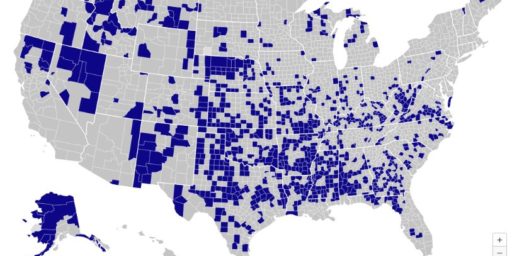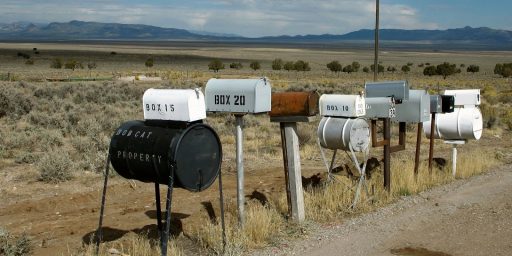Subsidizing Broadband
Matthew Yglesias who, unlike Wonkette I actually met at the Wonkette launch party, reacts to an apparently vague yet bold plan on the part of the Bush administration mentioned by Kevin Drum:
I’m sympathetic to this idea because it’s an infrastructure-building proposal and I think we need more infrastructure spending in this country. On the other hand, though, it seems to me that in practice it would wind up being one more in a long series of wealth transfers directed at rural America. This whole interlocking series of policies aimed at trying to shore up the non-viable rural economy is a pretty significant waste of money and the farm protectionism that is its linchpin has morally repugnant results.
While I agree with Matt on the issue of farm subsidies–I’m again’ ’em–the percentage of the population, even in the rural South, engaged in agriculture continues to dwindle. The problem with providing infrastructure in rural areas isn’t that they’re engaged in agriculture or, indeed, necessarily impoverished but rather low population density.
On the main, I’m not sure I understand why the private sector can’t provide broadband on a profit incentive. Truly rural places like Wyoming and the Dakotas would require subsidization to get broadband on par with urban centers, since the concentration of users is so scattered. Or, they could just accept lack of all the conveniences of modernity as one of the trade-offs of living in the hinterlands. And satellite broadband is available in even the most remote locations. Nearly two years ago, I moved from Troy, Alabama (population 5000 or so) to the Dulles high tech corridor–less than five miles from both then-Worldcom and AOL and the second fastest growing county in the country. Yet, I had better broadband access–two competing cable companies–than I’ve found here.
I just don’t fundamentally see a problem with letting rural areas continue to depopulate while America’s metro areas grow. With the exception of New York, every city in the United States is pretty low-density outside of a relatively tiny downtown business districy (look at Washington’s endless tracts of three story row houses in neighborhoods both fancy and decrepit), a situation that could be easily changed by altering some tax and zoning rules in a way that could radically lower urban (and, consequently, inner-suburban) housing prices even while permitting a much larger concentration of people in the regions of this country that have viable economic bases.
I haven’t studied the demographics very closely but was under the impression that the opposite phenomenon had been the trend for 40 years or so, namely the mass exodus of the big population centers, especially the Rust Belt, for the more rural areas of the Sun Belt, as evidenced by shifts in Congressional Districts and the Electoral College after the last several decennial censuses.
I’m not sure what government policies we’d enact to solve the housing crunch in the big cities. Washington, Boston, and San Diego aren’t getting any bigger. More people are moving in. In D.C., a townhouse smaller than the crappy apartment I rented for $200 a month in grad school–furnished!–goes for well over a million dollars. Where I live–35 miles from downtown Washington–houses are selling the day they go on the market for insane prices. The townhouse I bought five months ago has already appreciated $35,000 in value. I suppose we could subsidize the construction of high-rise apartments, but one suspects the historical preservation crowd would be up in arms over that. And, of course, a substantial number of people are willing to endure very long commutes in order to have a bigger house in a safer neighborhood to raise their children.





I don’t recall WHEN, but I do recall a short time ago (say, 10 years or so)someone e-mailing me some UN documents that stated that moving the populations to the cities was goal of theirs.
The stated reasns were environmental ones.
The objection at the time was that the plan was REALLY being invoked becasue so centralized, the populations would be easier to control, for two reasons; sheer location, for one thing… the other being a bit more subtle…
That being that people living in the country, in relative isoaltion, tend to be more independance minded, whereas living in close proximity to one another tends to lean people toward the left politically, and they would be more inclined toward world government, thereby….thus reinforcing the authority of such orgs as the UN.
Hmmmm… I wonder.
Asimov has a story line along those lines. A few big cities and everybody afraid to go outside. Can’t say I’m crazy about the idea, myself.
(“Caves of Steel” and sequels for the illiterate)
Like many problems, the best thing the government can do is stay out.
New technologies will appear that will give POTS users broadbandish ability soon enough.
This is the best you could bring us from the Wonkette party?
I’m going to have a blog launch party, dammit, and when it’s over sure-as-hell nobody’s going to be talking about broadband…..
It’s really amazing the lengths to which we will go, as a society, to avoid encouraging entrepreneurship. To me, that’s about the only thing that actually has a chance of “saving” rural America.
The farm economy is a disaster. If it were any other business, it would have corkscrewed itself into the ground a long time ago. Technological advances, along with a dwindling supply of farmland (thanks to everybody’s desire to have a bigger house in a safer neighborhood, even if it does mean they have to leave for work at 4 AM) have raised operating costs to the point that there’s scarcely any money left to be made. (The Amish, I understand, remain quite profitable.)
This could all be solved with the formation of farming corporations, which could lower production costs, hire farmers who would get pensions and health-care benefits, etc., etc. Unfortunately, this option was made illegal in many Midwestern states during the 80s and 90s.
I’m a little insulted. I live smack dab in the middle of rural America and we’ve had broadband for a couple of years now. In fact, its readily available at pretty reasonable rates in most places. Thanks to the long winters here, just about every farmer I know has internet access, and a lot of them are moving to broadband.
Do you guys from the big cities think we’re all just a bunch of backward rubes? Give me a break.
We don’t need better access to broadband internet, we need to light a fire under the agriculture industry’s collective butts so they’ll develop some of that entrepreneurial spirit instead of depending on taxpayers for subsidies.
$200 a month? At no point in my lifetime was housing available in LA at that price. I’m pretty sure. (Wait a minute. I had a two-bedroom place in the slums of Venice, CA when I was in college that went for $420/month. I split this with someone else, so I guess I did have insanely low housing costs. OTOH, I got mugged twice and eventually decided to move away for fear of my own safety.)
If I remember correctly, I paid $150/mo for my apartment in Monterey, CA…in 1975. It was an old building back then, and I drove by the place last summer, and it’s still in operation, although I’d bet the rent’s a bit higher these days.
In North Dakota I own a three-bedroom, two bath home situated two blocks from a school for which I pay $350/month.
—